初中英语七年级必备整理句型转换陈述句变一般疑问句特殊疑问句及练习
- 格式:doc
- 大小:37.00 KB
- 文档页数:8
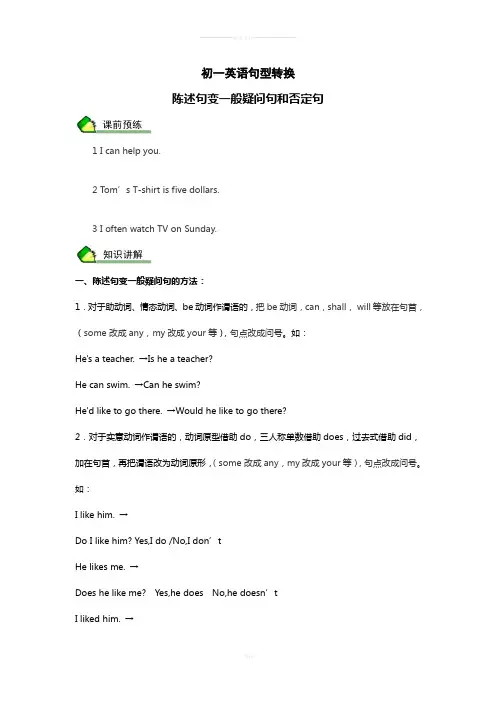
初一英语句型转换陈述句变一般疑问句和否定句1 I can help you.2 Tom’s T-shirt is five dollars.3 I often watch TV on Sunday.一、陈述句变一般疑问句的方法:1.对于助动词、情态动词、be动词作谓语的,把be动词,can,shall, will等放在句首,(some 改成any,my改成your等),句点改成问号。
如:He's a teacher. →Is he a teacher?He can swim. →Can he swim?He'd like to go there. →Would he like to go there?2.对于实意动词作谓语的,动词原型借助do,三人称单数借助does,过去式借助did,加在句首,再把谓语改为动词原形,(some 改成any,my改成your等),句点改成问号。
如:I like him. →Do I like him? Yes,I do /No,I don’tHe likes me. →Does he like me? Yes,he does No,he doesn’tI liked him. →Did I like him? Yes,I did No,I didn’tI will go there by bus. →Will I go there by bus? Yes,I will No,I won’t二、肯定句变否定句的方法1、在be动词后加not。
如:is not , are not , am not, was not, were not;2、在can,should, will等后加not。
如:cannot, should not, will not;3、上述都没有的,在动词前加助动词否定形式don’t/doesn’t/didn’t。
4、 some 改成any。
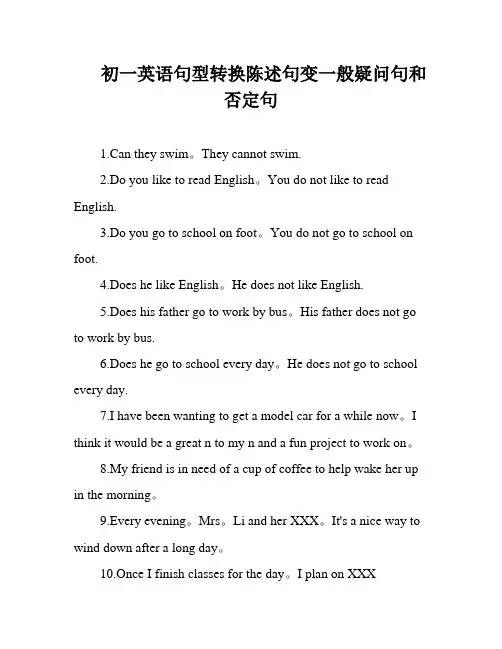
初一英语句型转换陈述句变一般疑问句和否定句1.Can they swim。
They cannot swim.2.Do you like to read English。
You do not like to read English.3.Do you go to school on foot。
You do not go to school on foot.4.Does he like English。
He does not like English.5.Does his father go to work by bus。
His father does not go to work by bus.6.Does he go to school every day。
He does not go to school every day.7.I have been wanting to get a model car for a while now。
I think it would be a great n to my n and a fun project to work on。
8.My friend is in need of a cup of coffee to help wake her up in the morning。
9.Every evening。
Mrs。
Li and her XXX。
It's a nice way to wind down after a long day。
10.Once I finish classes for the day。
I plan on XXX11.Despite being a young boy。
I understand the XXX。
That's why I always make sure to help out with some housework。
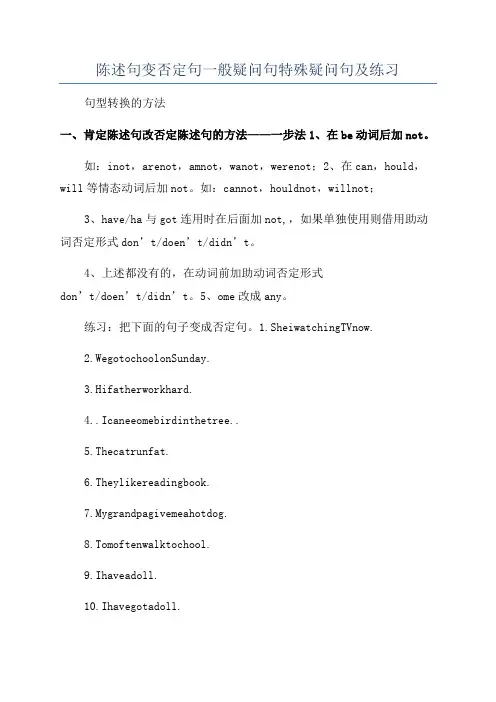
陈述句变否定句一般疑问句特殊疑问句及练习句型转换的方法一、肯定陈述句改否定陈述句的方法——一步法1、在be动词后加not。
如:inot,arenot,amnot,wanot,werenot;2、在can,hould,will等情态动词后加not。
如:cannot,houldnot,willnot;3、have/ha与got连用时在后面加not,,如果单独使用则借用助动词否定形式don’t/doen’t/didn’t。
4、上述都没有的,在动词前加助动词否定形式don’t/doen’t/didn’t。
5、ome改成any。
练习:把下面的句子变成否定句。
1.SheiwatchingTVnow.2.WegotochoolonSunday.3.Hifatherworkhard.4..Icaneeomebirdinthetree..5.Thecatrunfat.6.Theylikereadingbook.7.Mygrandpagivemeahotdog.8.Tomoftenwalktochool.9.Ihaveadoll.10.Ihavegotadoll.二、肯定句改一般疑问句的方法——三步法1、把be动词放在句首,剩下的照抄,(ome改成any,my改成your 等)句点改成问号。
例如:陈述句:Theyareinthepark.一般疑问句:Aretheyinthepark2、把can,hall,will等情态动词放到句首,剩下的照抄,(ome 改成any,my改成your等)句点改成问号。
例如:陈述句:Hecanplaytheguitar.一般疑问句:Canheplaytheguitar3、have/ha与got连用时直接放在句首,如果单独使用则借用助动词do/doe/did4、上述都没有的,在句首请助动词Do/Doe/Did帮忙,剩下的照抄,(ome改成any,my改成your等)句点改成问号。
例如:陈述句:⑴Iliketheduck.→Helikethedog.一般疑问句:⑵Doyouliketheduck→Doehelikethedog2注意:ome常用于肯定陈述句当中,any常用于否定陈述句和疑问句中,但注意特殊用法:在表示请求或建议,并希望得到对方的肯定回答时,ome也可以用于疑问句中。
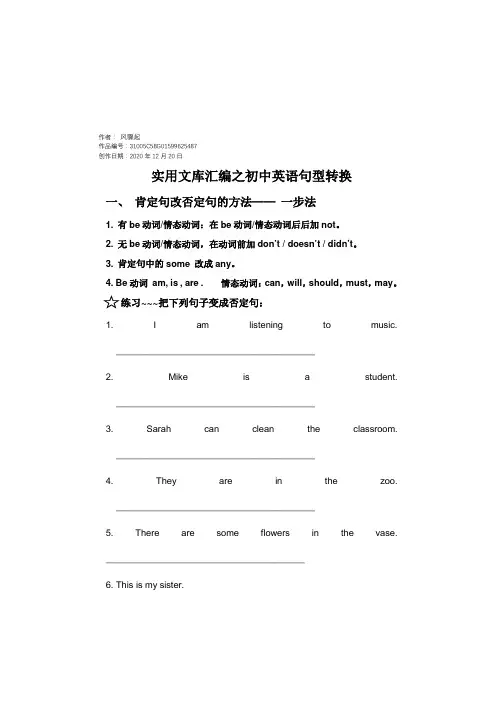
作者:风骤起作品编号:31005C58G01599625487创作日期:2020年12月20日实用文库汇编之初中英语句型转换一、肯定句改否定句的方法——一步法1. 有be动词/情态动词:在be动词/情态动词后后加not。
2. 无be动词/情态动词,在动词前加don’t / doesn’t / didn’t。
3. 肯定句中的some 改成any。
4. Be动词am, is , are . 情态动词:can,will,should,must,may。
练习~~~把下列句子变成否定句:1. I am listening to music._______________________________________2. Mike is a student._______________________________________3. Sarah can clean the classroom._______________________________________4. They are in the zoo._______________________________________5. There are some flowers in the vase. _______________________________________6. This is my sister._______________________________________7. We are sweeping the floor. ___________________________8. We need some masks. _________________________________9. They like making the puppet._________________________________10. Su Hai and Su Yang live in a new house.______________________________________________11. I put a book on my head._________________________________________________12. They sing “In the classroom”together. _______________________________________________13. We play basketball on Sundays._________________________________________________14. Tom likes listening to music.____________________________________________15. We go to school on Sunday. _________________________________________________16. His father works hard._________________________________________________17. Alice will go to the Summer Palace. ____________________________________________18. You should study hard for yourself . __________________________________________二、肯定句改一般疑问句的方法——三步法1. 有be动词/情态动词:be动词/情态动词提到句首,其余照抄,(some 改any,my改your)句末用问号。
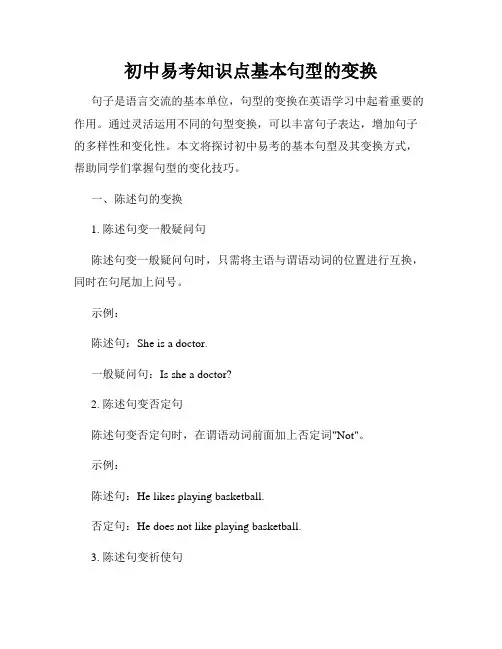
初中易考知识点基本句型的变换句子是语言交流的基本单位,句型的变换在英语学习中起着重要的作用。
通过灵活运用不同的句型变换,可以丰富句子表达,增加句子的多样性和变化性。
本文将探讨初中易考的基本句型及其变换方式,帮助同学们掌握句型的变化技巧。
一、陈述句的变换1. 陈述句变一般疑问句陈述句变一般疑问句时,只需将主语与谓语动词的位置进行互换,同时在句尾加上问号。
示例:陈述句:She is a doctor.一般疑问句:Is she a doctor?2. 陈述句变否定句陈述句变否定句时,在谓语动词前面加上否定词"Not"。
示例:陈述句:He likes playing basketball.否定句:He does not like playing basketball.3. 陈述句变祈使句陈述句变祈使句时,除去主语,将谓语动词直接使用原形,表示一种命令、请求或建议。
示例:陈述句:You should study hard.祈使句:Study hard.二、疑问句的变换1. 一般疑问句变陈述句一般疑问句变陈述句时,将疑问句中的助动词或情态动词去掉。
示例:一般疑问句:Do you like ice cream?陈述句:You like ice cream.2. 特殊疑问句变陈述句特殊疑问句变陈述句时,将特殊疑问句中的疑问词与句子其他部分保持原来顺序即可。
示例:特殊疑问句:Where is the library?陈述句:The library is at the corner of the street.三、否定句的变换1. 否定句变陈述句否定句变陈述句时,去掉否定词"Not"。
示例:否定句:He does not like playing soccer.陈述句:He likes playing soccer.2. 否定句变一般疑问句否定句变一般疑问句时,只需将否定词"Not"与陈述句的其他部分交换位置即可。
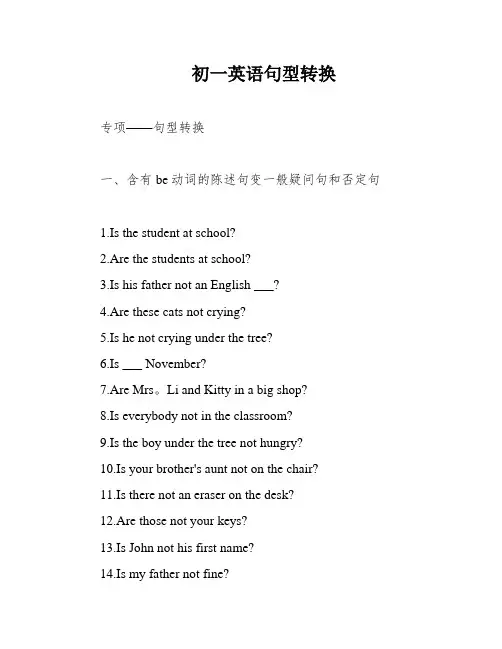
初一英语句型转换专项——句型转换一、含有be动词的陈述句变一般疑问句和否定句1.Is the student at school?2.Are the students at school?3.Is his father not an English ___?4.Are these cats not crying?5.Is he not crying under the tree?6.Is ___ November?7.Are Mrs。
Li and Kitty in a big shop?8.Is everybody not in the classroom?9.Is the boy under the tree not hungry?10.Is your brother's aunt not on the chair?11.Is there not an eraser on the desk?12.Are those not your keys?13.Is John not his first name?14.Is my father not fine?15.Is this not a short?16.Are there not two pens in the pencil case?17.Are the boys not my good friends?二、不含be动词(即含行为动词)的陈述句变一般疑问句和否定句1.Can they not swim?2.Do you not like to read English?3.Do you not go to school on foot?4.Does he not like English?5.Does his father not go to work by bus?6.Does he not go to school every day?7.Do you not want to have a model car?8.Does she not want a cup of coffee?9.Do Mrs。
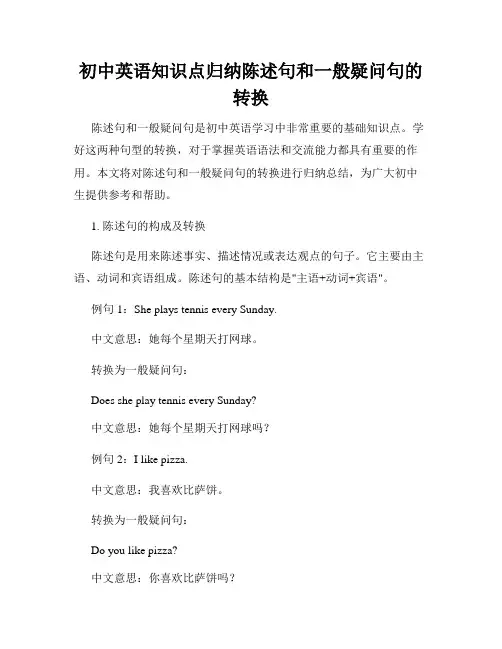
初中英语知识点归纳陈述句和一般疑问句的转换陈述句和一般疑问句是初中英语学习中非常重要的基础知识点。
学好这两种句型的转换,对于掌握英语语法和交流能力都具有重要的作用。
本文将对陈述句和一般疑问句的转换进行归纳总结,为广大初中生提供参考和帮助。
1. 陈述句的构成及转换陈述句是用来陈述事实、描述情况或表达观点的句子。
它主要由主语、动词和宾语组成。
陈述句的基本结构是"主语+动词+宾语"。
例句1:She plays tennis every Sunday.中文意思:她每个星期天打网球。
转换为一般疑问句:Does she play tennis every Sunday?中文意思:她每个星期天打网球吗?例句2:I like pizza.中文意思:我喜欢比萨饼。
转换为一般疑问句:Do you like pizza?中文意思:你喜欢比萨饼吗?总结:要将陈述句转换为一般疑问句,需要在句子开头加上相应的助动词。
如果原句中有助动词或情态动词,则直接将其调整到句首即可。
2. 一般疑问句的构成及转换一般疑问句用来询问对方的看法、意见或确切的事实。
它的基本结构是助动词/情态动词 + 主语 + 动词 + 其他。
例句1:They have finished their homework.中文意思:他们已经完成了作业。
转换为陈述句:Have they finished their homework?中文意思:他们已经完成了作业吗?例句2:Can you swim?中文意思:你会游泳吗?转换为陈述句:You can swim.中文意思:你会游泳。
总结:要将一般疑问句转换为陈述句,需要去掉句子开头的助动词/情态动词,并根据句子意思调整主谓语序。
3. 特殊疑问句与陈述句/一般疑问句的转换特殊疑问句用来询问某个具体信息或者事实的问题。
它的基本结构是疑问词 + 助动词/情态动词 + 主语 + 动词 + 其他。
例句1:Where is the library?中文意思:图书馆在哪里?转换为一般疑问句:Is the library there?中文意思:图书馆在那里吗?总结:在特殊疑问句转换为一般疑问句时,需要将疑问词调整到句子的开头,并调整主谓语序。
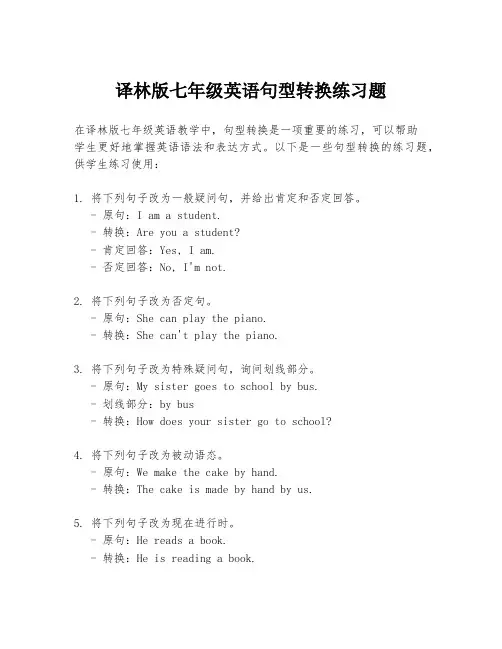
译林版七年级英语句型转换练习题在译林版七年级英语教学中,句型转换是一项重要的练习,可以帮助学生更好地掌握英语语法和表达方式。
以下是一些句型转换的练习题,供学生练习使用:1. 将下列句子改为一般疑问句,并给出肯定和否定回答。
- 原句:I am a student.- 转换:Are you a student?- 肯定回答:Yes, I am.- 否定回答:No, I'm not.2. 将下列句子改为否定句。
- 原句:She can play the piano.- 转换:She can't play the piano.3. 将下列句子改为特殊疑问句,询问划线部分。
- 原句:My sister goes to school by bus.- 划线部分:by bus- 转换:How does your sister go to school?4. 将下列句子改为被动语态。
- 原句:We make the cake by hand.- 转换:The cake is made by hand by us.5. 将下列句子改为现在进行时。
- 原句:He reads a book.- 转换:He is reading a book.6. 将下列句子改为过去时。
- 原句:They play football.- 转换:They played football.7. 将下列句子改为将来时。
- 原句:She watches TV.- 转换:She will watch TV.8. 将下列句子改为条件句。
- 原句:I will go to the park if it is sunny.- 转换:If it is sunny, I will go to the park.9. 将下列句子改为间接引语。
- 原句:She said, "I am going to the library."- 转换:She said that she was going to the library.10. 将下列句子改为强调句。
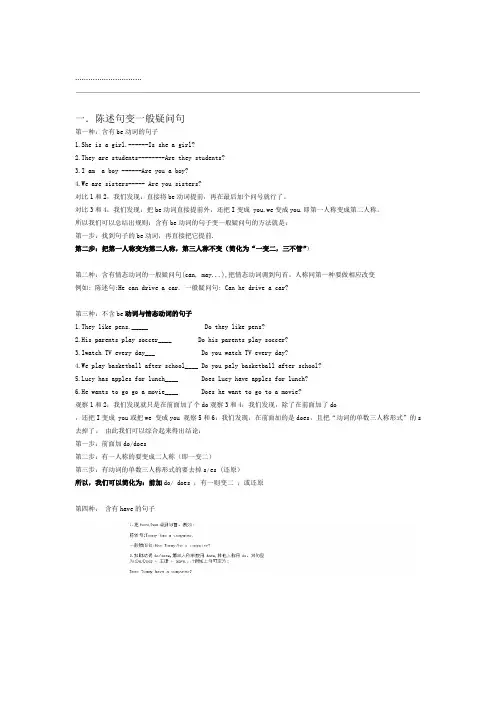
…………………………一.陈述句变一般疑问句第一种:含有be动词的句子1.She is a girl.------Is she a girl?2.They are students--------Are they students?3.I am a boy ------Are you a boy?4.We are sisters----- Are you sisters?对比1和2,我们发现:直接将be动词提前,再在最后加个问号就行了。
对比3和4,我们发现:把be动词直接提前外,还把I变成 you,we变成you.即第一人称变成第二人称。
所以我们可以总结出规则:含有be动词的句子变一般疑问句的方法就是:第一步:找到句子的be动词,再直接把它提前.第二步:把第一人称变为第二人称,第三人称不变(简化为“一变二,三不管”)第二种:含有情态动词的一般疑问句(can, may...),把情态动词调到句首。
人称同第一种要做相应改变例如: 陈述句:He can drive a car. 一般疑问句: Can he drive a car?第三种:不含be动词与情态动词的句子1.They like pens._____ Do they like pens?2.His parents play soccer____ Do his parents play soccer?3.Iwatch TV every day___ Do you watch TV every day?4.We play basketball after school____ Do you paly basketball after school?5.Lucy has apples for lunch____ Does Lucy have apples for lunch?6.He wants to go go a movie____ Does he want to go to a movie?观察1和2:我们发现就只是在前面加了个do观察3和4:我们发现,除了在前面加了do,还把I变成 you或把we 变成you 观察5和6:我们发现,在前面加的是does,且把“动词的单数三人称形式”的s 去掉了。
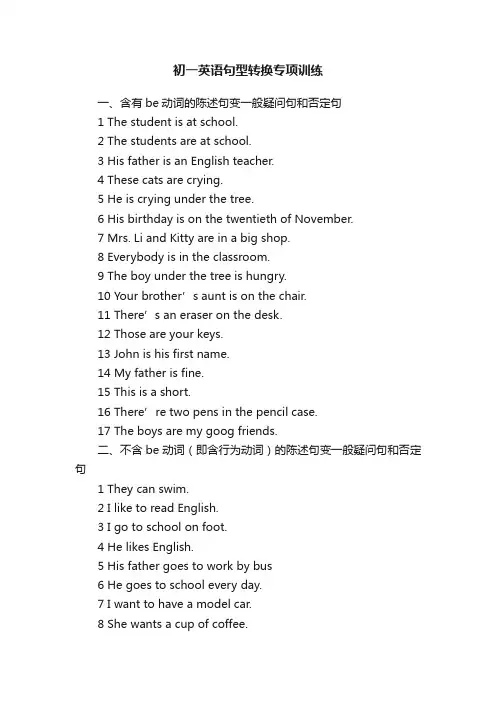
初一英语句型转换专项训练一、含有be动词的陈述句变一般疑问句和否定句1 The student is at school.2 The students are at school.3 His father is an English teacher.4 These cats are crying.5 He is crying under the tree.6 His birthday is on the twentieth of November.7 Mrs. Li and Kitty are in a big shop.8 Everybody is in the classroom.9 The boy under the tree is hungry.10 Your brother’s aunt is on the chair.11 There’s an eraser on the desk.12 Those are your keys.13 John is his first name.14 My father is fine.15 This is a short.16 There’re two pens in the pencil case.17 The boys are my goog friends.二、不含be动词(即含行为动词)的陈述句变一般疑问句和否定句1 They can swim.2 I like to read English.3 I go to school on foot.4 He likes English.5 His father goes to work by bus6 He goes to school every day.7 I want to have a model car.8 She wants a cup of coffee.9 Mrs. Li and Kitty watch television at night.10 I do my homework after school.11 The boy does some housework at home.12 The children had a good time in the park.13 Jim has some story-books.14 Mr. Hunt tell us something important at the meeting.15 The old man does morning exercises every morning.16 I must finish my homework before eight o’clock.17 He often goes to the library on Sundays.18 They have a class meeting every week.19 We are going to see him tomorrow.20 The story sounds very interesting.21 I can help you.22 Tom’s T-shirt is five dollars.23 I often watch TV on Sunday.三、对划线部分进行提问——特殊疑问句1 I am fine.2 His name is John Smith.3 My last name is Brown.4 John is his first name.5 Her phone number is 929316 That is a phone.7 This is a ruler in English.8 It is a watch.9 his is a pen.10 hat’s my sister.11 They’re my aunts.12 This is his cousin.13 Her backpack is on the chair.14 His keys are in his pocket.15 My alarm clock is on the sofa.16 Her pencil is between the keys.17 I can see some books on the bookshelf.18 David’s video tape is on the table.19 He has a computer.20 Twins have some balls.21 My father likes strawberries.22 She eats fruit and hamburger for lunch.23 I like the black shoes.24 His bags are next to the desk.25 The girl in yellow is Amy. 27 The boy in green is my brother.28 My new short is blue.29 The yellow shirt is sixteen yuan.30 He likes green.31 These tomatoes are ¥9.32 He wants a green bag.33 He wants a green bag34 These shoes are five dollars.35 The pair of socks is blue.36 My little brother is 17 years old.37 The green socks are 6 yuan.38 His birthday is October 1st.39 I was born in 1986.40 Mary ‘s birthday is October eleventh.41 We have an Art Festival each year.42 My sister is twelve.43 We have a music Festival each year.44 We have a school trip on October 21st.45 I have twelve balls.46 I have my sweater for 35 yuan.47 He likes Chinese action movies.48 My favorite movie star is Jackis Chan.50 His father likes documentaries.51 He wants to join the art club.52 Those girl can dance.53 The want to join the art club.54 Can you play the violin ?55 She gets home at 7:30.56 My mother often makes breakfast for me in the morning.57 I want to clean a lot about China because I love China.58 Alice takes a shower in the morning.59 She has breakfast at around seven thirty.60 He likes science because it’s interesting.61 Mr Zhang is my math teacher62 That old man is my uncle.63 We have science on Tuesday and Thursday.64 He likes history because it’s interesting65 Because P.E.is fun, I like it.66 He usually does his homework in the evening.人教版初一英语句型转换专练A.将下列句子改为否定句。
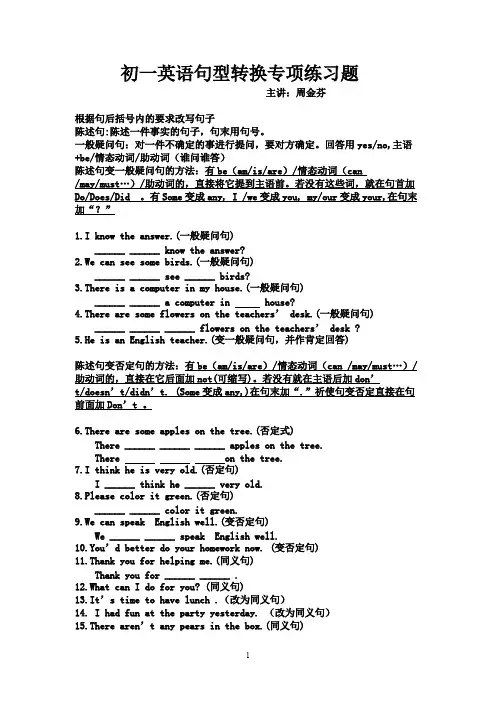
矿产资源开发利用方案编写内容要求及审查大纲
矿产资源开发利用方案编写内容要求及《矿产资源开发利用方案》审查大纲一、概述
㈠矿区位置、隶属关系和企业性质。
如为改扩建矿山, 应说明矿山现状、
特点及存在的主要问题。
㈡编制依据
(1简述项目前期工作进展情况及与有关方面对项目的意向性协议情况。
(2 列出开发利用方案编制所依据的主要基础性资料的名称。
如经储量管理部门认定的矿区地质勘探报告、选矿试验报告、加工利用试验报告、工程地质初评资料、矿区水文资料和供水资料等。
对改、扩建矿山应有生产实际资料, 如矿山总平面现状图、矿床开拓系统图、采场现状图和主要采选设备清单等。
二、矿产品需求现状和预测
㈠该矿产在国内需求情况和市场供应情况
1、矿产品现状及加工利用趋向。
2、国内近、远期的需求量及主要销向预测。
㈡产品价格分析
1、国内矿产品价格现状。
2、矿产品价格稳定性及变化趋势。
三、矿产资源概况
㈠矿区总体概况
1、矿区总体规划情况。
2、矿区矿产资源概况。
3、该设计与矿区总体开发的关系。
㈡该设计项目的资源概况
1、矿床地质及构造特征。
2、矿床开采技术条件及水文地质条件。
陈述句变否定句一般疑问句特殊疑问句及练习(全面)希伯伦语法一一、肯定句改否定句的方法——一步法She is watching TVnow. _________________________________________________We go to school onSunday. ______________________________________________His father workshard. ________________________________________________Jack's mother is anurse. _______________________________________________The cat runsfast. _________________________________________________They like readingbooks. _______________________________________________My grandpa gives me a hotdog. _________________________________________________Tom often walks toschool.I have adoll. _________________________________________________It is eatingfish. _________________________________________________下列句子变成一般疑问句1. I am listening tomusic. _____________________________________2. Mike is a student.3. Sarah can clean theclassroom.4. They are in thezoo.5. There are some flowers in thevase.6. This is mysister.7・We are sweeping thefloor.1. We need some masks. _______________________________2. They like making thepuppet. ________________________________3. Su Hai and Su Yang live in a newhouse. _______________________________________________4.1 p ut a book on myhead. ________________________________________________ 5. They sing “In theclassroom ” together. __________________________________6. We play basketball onSundays. _____________________________________________7. Tom likes listening tomusic ___________________________________________综合训练(一)陈述句变一般疑问句练习1. His father is an English teacher.2. These cats are crying.3. They can swim.4. I like to read English.5. I go to school on foot.6. He likes English.7. His father goes to work by bus.8. He is crying under the tree.9. His birthday is on the twentieth of November.10. Mrs. Li and Kitty are in a big shop.11. Kitty is wearing her new uniform.12. The boy under the tree is hungry.13. He goes to school every day.15. I want to have a model car.16. She wants a cup of coffee.17. Mrs. Li and Kitty watch television at night.18. I do my homework after school综合训练(二)将下列句子改成一般疑问句:1. It is a lovely dog .-2. She is lovelygirl. _______________________________________3. You are a singer. _____________________________4. They are Lily ' s cousins.5. We are classmates.6. I am a doctor.7. There is a bird in the tree.8. There are many stars in the sky.10.1 love my parents.11.1 play computer games every night. 14・We have a pleasant home. 15. W e like to climb the mountain. 16. They go to church on Sunday. 17. They walk to school every morning.18.lt is a beautiful park.______________________________ 3 •划线部分是谓语动词及宾语时,应使用what …do/doing/done 替换划线部分。
句型转换一、肯定句变否定句:1、在be动词后加not。
如:is not , are not , am not, was not, were not;2、在情态动词can,should, will等后加not。
如:cannot, should not, will not;3、既有be动词又有情态动词,在情态动词后加not。
如:There won’t be a meeting.4、上述都没有的,在动词前加助动词否定形式don’t/doesn’t/didn’t。
特殊情况:1. 如果肯定句中有连词 and ,变为否定句时,通常要将 and 变为 or 。
例如:The girl can sing and dance. → The girl cannot sing or dance.2. 如果肯定句中 some ,变为否定句时, some 一般要改为 any 。
例如:There are some boys in the room. → There are not any boys in the room.3. 如果肯定句中有 too (也),变为否定句时,应将 too 改为 either 。
例如:Wang Ling is a teacher, too. → Wang Ling is not a teacher, either.4. 如果肯定句中有 already ,变为否定句时,应将 already 改为 yet ,并放在句末。
例如:The worker has finished his work already. → The worker has not finished his work yet.5. 如果肯定句中有“ had better ”,变为否定句时, not 要放在“ had better ”之后。
例如:You had better write to your teacher. → You had better not write to your teacher.6. 如果肯定句中有 always ,变为否定句时,要将 always 改为 never 。
初一英语语法--句型转换(详细内容)初一英语语法—句型转换内容:陈述句:肯定句否定句疑问句:一般疑问句特殊疑问句一.肯定句变否定句1.句子中有be,在be后加not。
(be动词有am , is , are, was, were)1)I am a student. I am not a student.2)They are blue . They aren’t blue.3) He is Kangkang. He is n’t Kangkang .4) I was ten last year. I wasn't ten yesterday.5) He was good at English. He wasn't good at English.6) They were at home last Sunday. They weren't at home last Sunday.练习:把下列句子变为否定句1.His father is an English teacher._____________________________2.He is crying under the tree. ___________________________ __3.He was thirteen years old two years ago._______________________4.They are very lucky.______________________________________5.t the family was poor.6.My voice was too weak.2.谓语是动词原形,在动词前加don’t。
7.I have a book . I don’t have a book.8.They like Chinese . They don’t like Chinese.9.3) We come from China. We don’t come from China.3.谓语动词是第三人称单数,在动词前加doesn’t,动词用原形。
初中英语句型转换基本助动词只有三个:be, do, have, 他们没有词汇意义,只有语法作用,如协助构成进行体,完成体,被动态,否定句,疑问句等。
一、肯定句改否定句的方法——一步法1. 有be动词/情态动词:在be动词/情态动词后后加not。
2. 无be动词/情态动词,在动词前加don’t/doesn’t/didn’t。
3. some 改成any。
4. 情态动词:can,will,should,must,may。
把下列句子变成否定句:1. I am listening to music. _______________________________________2. Mike is a student. _______________________________________3. Sarah can clean the classroom. ________________________________________4. They are in the zoo. ________________________________________5. There are some flowers in the vase. ________________________________________6. This is my sister. _________________________________________7. We are sweeping the floor. __________________________________________8. We need some masks. _________________________________9. They like making the puppet. _________________________________10. Su Hai and Su Yang live in a new house._________________________________________________11. I put a book on my head._________________________________________________12. They sing “In the classroom”together. _______________________________________________13. We play basketball on Sundays._________________________________________________14. Tom likes listening to music____________________________________________二、肯定句改一般疑问句的方法——三步法1. 有be动词/情态动词:be动词/情态动词提到句首,其余照抄,(some改成any,my改成your)句末用问号。
2. 无be动词/情态动词,在句首加Do/Does/Did,其余照抄,(some改成any,my改成your)句末用问号。
3. 加Does、did 的句子注意,句子动词要变成原型。
例如:陈述句: They are in the park. He can play the guitar..一般疑问句: Are they in the park? C an he play the guitar?陈述句: I like the ducks. He likes the dogs.一般疑问句:Do you like the ducks? Does he like the dogs?把下列句子变成一般疑问句1. I am listening to music. _______________________________________2. Mike is a student. _______________________________________3. Sarah can clean the classroom. ________________________________________4. They are in the zoo. ________________________________________5. There are some flowers in the vase. ________________________________________6. This is my sister. _________________________________________7. We are sweeping the floor. __________________________________________8. We need some masks. _________________________________9. They like making the puppet. _________________________________10. Su Hai and Su Yang live in a new house._________________________________________________11. I put a book on my head._________________________________________________12. They sing “In the classroom”together. _______________________________________________13. We play basketball on Sundays._________________________________________________14. Tom likes listening to music____________________________________________三、肯定句改特殊疑问句的方法——四步法关于特殊疑问词问人(谁)who 地点(何地)where 时间(何时)when、what time 东西/职业/事物(什么) what方式方法程序身体(怎样)how年龄how old..怎么样(提建议)How about多少钱How much谁的whose book问星期what day问日期what date问数量多少(可数名词) How many people 问数量(不可数名词)How much water 颜色what color班级what class年级what grade时间what time哪一个whichwhich class1、根据划线部分确定是什么疑问词, 后面写原句变成的一般疑问句,句末问号。
2、how many后必须先写物品,再写一般疑问句等。
3. 如果划线部分是动词,则选练一练1、A: _______ is the boy in blue? B:He’s Mike.2、A: _______ pen is it? B:It’s mine.3、A: _______ is the diary? B:It’s under the chair.4、A: ___ is the Chirstmas Day? B: It’s on the 25th of December.5、A: _______ are the earphones? B:They are 25 yuan.6、A: _______ is the cup? B:It’s blue.7、A: _______ is it today? B:It’s Sunday.8、A: _______ was it yesterday? B: It was the 13th of October.9、A: _______ this red one? B:It’s beautiful.10、A: Can I have some paper and some crayons? B: _________________ ? A: I want to makea kite.12. A:_______ is your cousin? B: He’s 15 years old.13、A:_______ do you have dinner? B: At 6 o’cl ock.综合练习:1. The children have a good time in the park.否定句:___________________________________ 一般疑问句:___________________________________2. There are about nine hundred people at the concert.(音乐会)否定句:__________________________________________一般疑问句:________________________________________对划线部分提问:____________________________________3. There is only one problem.否定句:__________________________________________一般疑问句:________________________________________肯定/否定回答:____________________________________4. Ann does her homework every evening.否定句:__________________________________________一般疑问句:________________________________________对划线部分提问:____________________________________5. I read an English book every day.否定句:__________________________________________一般疑问句:________________________________________肯定/否定回答:____________________________________对划线部分提问:____________________________________6. My brother is in the park now.否定句:__________________________________________一般疑问句:________________________________________肯定/否定回答:____________________________________对划线部分提问:____________________________________7. She has some bread for lunch today.否定句:__________________________________________ 一般疑问句:_________________________________肯定/否定回答:____________________________________8. They read English every day.否定句:___________________________________ 一般疑问句:________________________________________ 肯定/否定回答:____________________________________对划线部分提问:____________________________________句型转换题一:1. The girl is singing in the classroom.(改为否定句)+ (改为一般疑问句)2. They are looking for bag.(对画线部分提问)3. I am riding my bike now.(同上)4. There are twelve studens over there.(同上)5. I can speak English.(改为一般疑问句)6. I am writing now.(同上)7. I have a desk and a chair.(用He做主语改写句子)8. She is buying some food in the supermarket.(改为否定句)9. I am ill. (对画线部分提问)10. Does she like growing flowers? (给予否定回答)11. I will make model planes with my classmates on Sunday. (对画线部分提问)12. The girl dances beautifully.(改为感叹句)13. The waiter and the waitress play table tennis every day.( 改为否定句)14. The boy is standing on the man's shoulders.(改为一般疑问句)15. It's ten o'clock.(对画线部分提问)句型转换题二:1.He does well in Maths. (改为否定句)2.Mike runs as fast as Ben. (改为一般疑问句)3.I get up at six thirty every day. (变否定)4.Jim is good at English and Maths. (对画线部分提问)5.Ben runs fast. I run faster. (两句合并为一句)6.The policeman catches the thief. (改为一般疑问句,作否定回答)7. He is thirty kilos. (对画线部分提问)8. Turn right at the third crossing. (改为否定句)9. How can I get to the shopping centre? (改为同义句)10 The computer is very nice. (改为感叹句)11.Are they American cars? (改为单数)12.Don’t go along this street. (改为肯定句)15.I get to the shopping centre by bus. (对画线部分提问)16. It always rains in summer there. (改为一般疑问句,作肯定回答)17. It’s cold in winter there. (对画线部分提问)18. I like autumn best. (改为否定句)19. Do you like spring? (加上winter 改为选择疑问句)20. Su Yang is asking Ben some questions. (对画线部分提问)21. Please turn off the light. (改为否定句)22. I know his telephone number. (改为一般疑问句)23. It is a fine day today. (改为感叹句)24. The children have school today. (改为否定句)25. I’d like to join them.(改为一般疑问句)26. They are going to see a film tomorrow. (对画线部分提问)27. I like collecting stamps and singing. (改为否定句)28. He often cleans his bedroom. (改为一般疑问句)29.Liu Tao is watering flowers in the garden. (对画线部分提问)30. David and Mike are going to planting trees this afternoon. (对画线部分提问)31. He does his homework in the classroom. (改为否定句)32. Wang Bing is heavier than Gao Shan. (对画线部分提问)33. Tom jumps as far as Mike. (改为否定句)34. I see a man behind me. (改一般疑问句)35. Helen is good at singing. (改一般疑问句)36. The boy can jump higher than the girl. (改为否定句)37. It is hot in summer in New York. (对画线部分提问)38. Liu Tao needs some pencils. (改为否定句)39. She is an English girl. (变为复数)40. They are our women doctors. (变为单数)41. Mary can fly. (变为一般疑问句,并作否定回答)42. I like playing football. (改成第三人称单数he)43. He has a brother. (改为一般疑问句)44. Nancy draws some pictures every day. (改为否定句)45. Liu Tao usually reads newspaper. (改为否定句)。